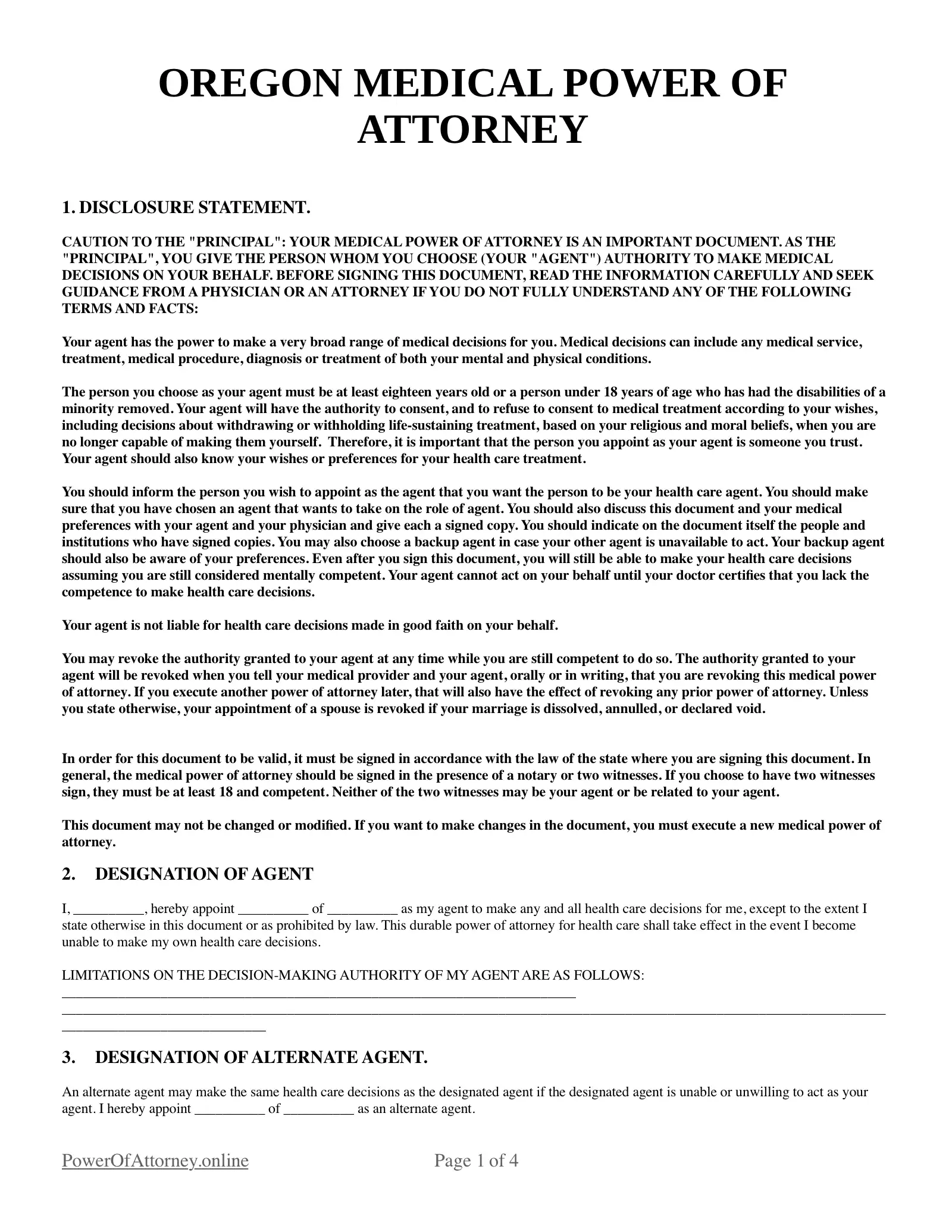Free Oregon Medical Power of Attorney Forms
A Medical Power of Attorney (MPOA) is a legal document in which a person (the "principal") authorizes another person (the "agent") to make healthcare decisions on their behalf if they are unable to communicate their preferences.
This ensures that medical decisions align with the principal's wishes, even if they are unable to articulate them.

Oregon Medical Power of Attorney Laws
In Oregon, the legal framework for a Medical Power of Attorney (MPOA) is outlined in the Oregon Revised Statutes, specifically in ORS Chapter 127.
This chapter defines the** process and legal application** of an MPOA in Oregon, where a "health care representative appointed under this paragraph shall make health care decisions for the principal if the principal becomes incapable."
This ensures that the principal's healthcare preferences are honored, aligning with their directives even when they cannot express them.
Signing Requirements in Oregon
For legal recognition of a Medical Power of Attorney form in Oregon, adherence to the state's signing requirements is crucial.
- Signing Requirements: The form must be signed before a notary public or in the presence of 2 witnesses (§ 127.515(2)).
These witnesses must be over eighteen and meet specific criteria to ensure their impartiality in the process.
How To Write a Medical POA in Oregon
To ensure your Oregon Medical Power of Attorney (MPOA) is effective and safeguards your interests, it must thoroughly outline all essential terms and personal information.
By meticulously navigating the MPOA creation process, you can be assured that, in the event of incapacity, your healthcare decisions are in trusted hands.
Consider the following step-by-step guide to assist you through the Oregon process:
1. Choose an agent or multiple agents
Select an agent who will be responsible for making healthcare decisions on your behalf. It's crucial to choose someone you trust implicitly and who understands your medical preferences.
Consider appointing a secondary agent to take over if your primary agent is unable or unwilling to act when needed.
2. Discuss with potential agent
Before finalizing your choice, have an open conversation with them. Discuss your medical preferences, fundamental values, and any specific directives you have.
This discussion ensures the agent understands the importance of their role and is comfortable with the responsibilities.
3. Use a customizable MPOA template
Creating an MPOA from scratch is possible, but using a template simplifies the process.
Our adaptable printable template allows you to customize your document to reflect your healthcare wishes while complying with Oregon's legal requirements.
This method is not only efficient but also more cost-effective than hiring an attorney.
4. Specify the agent's powers
List the **responsibilities **you are assigning to your agent. These can range from broad medical decisions to specific tasks such as:
- Directing end-of-life care
- Choosing surgical interventions
- Accessing medical records
- Making decisions about specific medical treatments
The clearer you are, the better prepared your agent will be to act according to your wishes.
5. Discuss compensation (if applicable)
Although some agents, especially family or friends, may not expect payment, it's important to address this topic. Some agents might expect compensation.
If you plan to pay your agent, specify the amount or rate in the document. Alternatively, state that the agent's compensation will be limited to reimbursements for expenses directly related to their role.
6. Sign the MPOA with the required witnesses
As per Oregon law, for your MPOA to be legally binding:
- The principal must sign the document
- It must be witnessed by 2 adult witnesses or notarized
Choose witnesses carefully, ensuring they are not the appointed agent, related to the principal, or have any financial interest in the principal's estate.
Once properly signed and witnessed or notarized, your MPOA becomes effective.